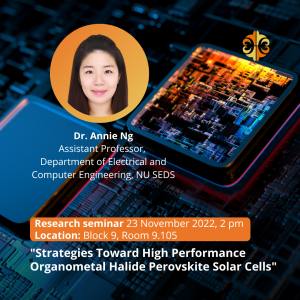NU SEDS Research seminar “Strategies Toward High Performance Organometal Halide Perovskite Solar Cells” by Assistant Professor Annie Ng
Kabanbay batyr 53

Nazarbayev University School of Engineering and Digital Sciences continues organizing research seminar series and invites you to attend the research seminar “Strategies Toward High Performance Organometal Halide Perovskite Solar Cells” by Assistant Professor Annie Ng, Department of Electrical and Computer Engineering, NU SEDS
Date: November 23, 2022, Wednesday
Time: 2 pm
Location: Block 9, Room 9.105
Dr. Annie Ng received her B.S. in Applied Physics from the City University of Hong Kong in 2009 and Ph.D. from the University of Hong Kong in 2014. She was awarded the Postdoctoral Fellowship from the Hong Kong Polytechnic University for her postdoctoral research works. She was also appointed as a visiting lecturer in the Department of Electronic and Information Engineering, the Hong Kong Polytechnic University in 2014. She is currently an assistant professor in Department of Electrical and Computer Engineering in Nazarbayev University. She has been working on energy materials for emerging photovoltaics. She is interested in optoelectronics, nanomaterials, semiconducting materials and device applications.
ABSTRACT: The organometal halide perovskite materials have been attracted increasing attentions due to their inherent material properties such as high absorption coefficients, tunable bandgaps, low exciton binding energy, large carrier diffusion lengths and high charge mobilities etc. leading to a wide range of applications particularly in photovoltaics. Perovskite solar cell (PSC) is one of the promising emerging PVs, which exhibit the most rapid enhancement in power conversion efficiency (PCE) compared to other types of PVs. Recently, the single-junction PSC and monolithic perovskite/silicon (Si) tandem devices have reached the record PCEs of 25.7% and 31.3% respectively, which are highly comparable to the commercialized PVs. Nevertheless, the stability and lifetime of PSCs should be significantly enhanced so that the devices can be operated at least for year scales (e.g 25 years for Si PVs) under the atmosphere ambient with temperature cycling and full exposure to the sunlight. Large-scale manufacturing with high reproducibility is another concern for future commercialization. Nowadays, increasing efforts from scientists and engineers have been placed on investigation of perovskite materials and solar cells in areas of material growth methods, crystallization dynamics, defect passivation, carrier transport properties, interface engineering etc. for ensuring high PCE and good stability of PSCs.
In this talk, some of the effective strategies such as reproducible perovskite growth methods, passivation treatments, interfacial engineering etc. will be discussed. The experimental results and findings can provide the community guidance for fabrication of high-performance PSCs.



